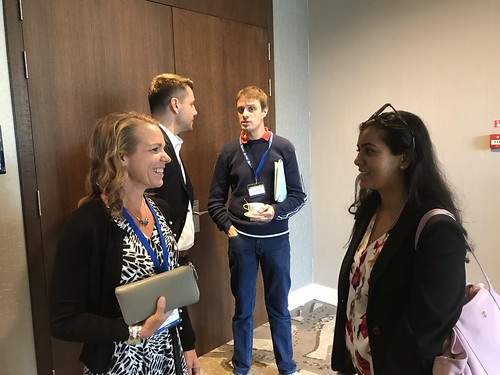“We must account for them.” My co-presenter Laura and I turned away from our lunches to see an older man not so subtly gesturing his hand up and down in our direction. After seeing the look of confusion on my face, Laura laughed and said, “He’s talking about us – ‘the younger generation,’” signaling air quotes around our label. Ah, of course. This was the first and most self-evident truth since we arrived at the conference earlier that morning. We were definitely the youngest in the room, but anticipating the likelihood of this was also part of the reason that I made sure I was present at Alcoa’s Sustainability Day on September 17, 2019.
On my fifth day in Europe, I made a quick day trip from Brussels, Belgium to Rotterdam, Netherlands to present at Alcoa’s Sustainability Day. Alcoa is an American-based aluminum producer – one of the largest in the world. The purpose of this Sustainability Day was to bring together stakeholders from all parts of the aluminum supply chain – from raw material to a final product – to share best practices and learnings for creating more sustainable processes and products. I was invited to speak with my colleague shortly before leaving my now former role at Tesla. We were asked to share a high-level overview of the sustainability trends Tesla has noticed and how it has worked to address them. Knowing the topic and its relevance to my Fulbright research on lithium-ion battery recycling, this seemed like a great opportunity to finetune my presentation skills, learn gaps and pressing questions that may help me better focus my research, and connect with others who also play a role in battery recycling.
In retrospect, the day provided me with all of those opportunities and more. While people seemed curious about who we were, Laura and I broke the ice through conversations throughout the day and with our presentation after which we tackled a host of questions during Q&A. The questions flowed during the networking event after the conference, and each conversation was instantly valuable. I met people from all over – Rotterdam, London, Brussels, and the U.S. – who worked on matters related to my research and either live or have contacts in my three research cities.
Amidst a number of valuable presentations from stakeholders in academia, non-profit organizations, and other companies, Dr. Martin Porter’s (Executive Chair, Cambridge Institute of Sustainability) keynote presentation has stuck with me most throughout my first three weeks in Europe. He was quick to establish his dual Belgian-British nationality and his pro-European stance within the first sixty seconds of his talk, which made me curious about the direction and message of his talk. He proceeded to draw parallels between Brexit and sustainability developments, and as a student of international politics and development, I found that very interesting. Dr. Porter said, like Brexit, sustainability development has two requirements: policy responses and public support (or absence of the opposition). He mentioned that sustainability policies have developed slowly but surely and has been limited to the “passionate margins.” This same passion is becoming more and more center, and it needs to break into the established “centers of power [that] live in a bubble – Paris, Berlin, London, Brussels, etc.” I cringed a little. He named every city on my Fulbright itinerary. Subconsciously, perhaps that was part of the reason I chose Brussels, Berlin, and London. Those are the places where EU and member-state policymaking and implementation occur in countries where technical battery recycling research is also ongoing.
Dr. Porter’s message challenged me to break the bubble, and I took note of it. To do this project and my time in Europe justice, the in-person contacts and cross-industry conversations are critical for raising awareness of the importance of e-mobility coupled with the need for battery recycling solutions, fighting climate skepticism, and onboarding popular support for pursuing a sustainable future, well, sustainably. After Alcoa’s Sustainability Day, I’ve tried to stay in touch with the attendees whom I met and attended a couple battery-related events in Brussels. I’ve sought out opportunities to meet with members of the battery industry and academia in hopes of “breaking the bubble,” but undeniably, rallying support for new recycling processes and sustainable best practices goes hand-in-hand with policy reform. For now, I’ve hit the ground running in Brussels with my host organization and am excited to spur the battery recycling conversation through my research!
Thank you to the Fulbright Commission for Educational Exchange between the United States, Belgium, and Luxembourg; this valuable experience wouldn’t have been possible without them. Thank you to Laurie Shelby (Tesla) for helping me discover my newfound interest in lithium-ion batteries, and thank you, Julia Poliscanova (Transport & Environment), for helping it grow. I am grateful and excited to expound upon this experience throughout my research in the EU. Afterall, this was only day one!
Bhavya Jha is a 2019-2020 Fulbright Research Scholar to the European Union. After graduating with a bachelor’s degree in International Politics and certificate in International Development from Georgetown University’s School of Foreign Service, Bhavya spent two years working in Environment, Health, and Safety at Tesla. Bhavya will spend time in Brussels, Berlin, and London throughout her Fulbright year researching lithium-ion battery recycling and and related policy development and implementation at the EU and member-state levels.
Articles are written by Fulbright grantees and do not reflect the opinions of the Fulbright Commission, the grantees’ host institutions, or the U.S. Department of State.



